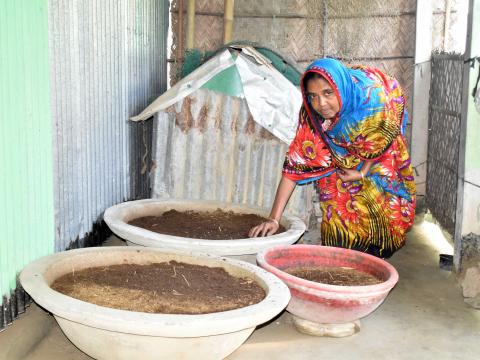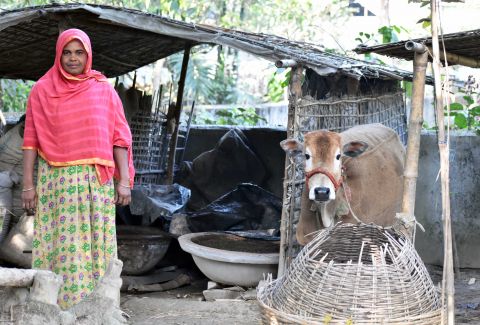Everyday rural women go entrepreneurial

Rural household women have plenty of leisure time during afternoon to practice some sort of revenue generation work. But it becomes important to select an enterprise, which does not require any major investment. A good example is Mrs. Minara Begum from Natuapara village of Fulbaria district in southwestern of Bangladesh and her other group members of fifty women who are successful entrepreneurs in vermin culture today.
All the 50 women come from economically poor families with land holding very minimum and have to depend on their husbands’ earnings for all their day to day requirements. Their husbands work as daily wage earners and earn about BDT 90-100 per day.

With irregular work and an uncertain income, the ladies were finding it quite hard to manage their families. They were introduced to the World Vision supported local value chain development group in their village, who are producing vermin compost and making profits. Women like Minara were provided with a training program on vermi-composting in 2015 and other several small entrepreneurship trainings like home stead gardening. Thereafter they were regularly assisted and supported to flourish the business by World Vision under its Fulbria Area Programme. . Where the women had no idea regarding the earthworms and used to feel disgust while they saw earthworms, the same earthworms have made them micro- entrepreneurs.
Minara Begum, a woman of 39, says: “vermin compost has ended my poverty.” Like, other 50 other women entrepreneurs those who are practicing the same trade, she also sells 25 kgs of compost per week in an average and earns BDT 800-1000 per month. The buyers sometimes come to the village for the collection of compost; at other times they take it to the packed compost in the nearby market. More, they also sell their vermin products to the Bangladesh Agricultural University and the selling price of ready-made compost ranges from BDT 18 to 25 per kg. The ladies use this money to meet up the educational expense of their children and also medical expenses of their families.
She further shares, “Now we can have three times meal in a day and meet the educational expenses of my children. This has just been possible due to close involvement with World Vision Bangladesh and its interventions. Through the project, she was also happy to start a home stead garden to feed her family more nutritious vegetables. With her keen eye for growth, Minara soon began using vermi-compost in her homestead garden and produces more production as well as earn handsome amount of money.
“We are happy that life has changed for good.” She also expressed that as vermicomposting was a new concept when it was started in the village. Even she was not confident if what she was pursuing was good. But now, she is praised for what she started. Her family has also realized the importance of the compost. It is amazing to see vermin compost, along with being a source of income is also used in her vegetable farming.
Around the world, the impact of extreme poverty on children’s development is devastating. Today. 900 million people are working but unable to lift themselves out of poverty. World Vision is working to break the cycle of intergenerational poverty by 2030 so that the most vulnerable children can reach their full potential through relief, development and advocacy work.
A significant contribution to SDG 1 (zero poverty) is through the incorporation of the Ultra-Poor Graduation model into World Vision’s Livelihoods Sector and long-term development strategy for the most vulnerable households. This is done through village saving promotion, integration of smallholder farmers into local value chain, agricultural commercialization, IGA, entrepreneurship, access to credit and insurance opportunities. In the reporting year of FY’18, our community focused solutions; ultra -poor graduation, youth employment and good progress in producers’ access to markets (value chain programming.) 57,432 beneficiaries under 46 projects in 21 districts received tools to overcome poverty, to better provide for their children’s health, education , nutrition and general wellbeing.